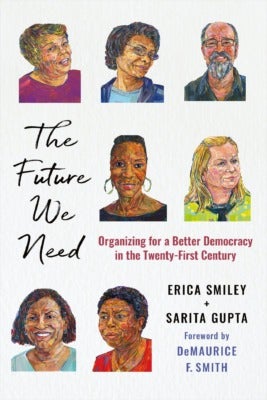The Future We Need: Organizing for a Better Democracy in the Twenty-First Century
Description
The last few years have left the US at a crossroads. Threats to democracy, the prevalence of bad jobs, and the continued battle against discrimination and hate have led some to question whether the American dream, progress toward the promise of equal opportunity, and the Great Experiment of democracy are lost. In the face of these challenges, people are once again turning to organizing. Workers are organizing their workplaces, the young and old are marching for social justice, and business leaders are proclaiming, “We stand for democracy.” Questions remain, however, about what forms of organizing will succeed in addressing the multitude of issues we face.

In their new book, “The Future We Need: Organizing for a Better Democracy in the Twenty-First Century,” authors Erica Smiley and Sarita Gupta argue that collective bargaining can be used to help improve work, help address discrimination, and improve the health of our democracy. Smiley, executive director of Jobs With Justice, and Gupta, the Ford Foundation’s vice president of US programs, “bring a novel perspective to building worker power and what labor organizing could look like in the future, suggesting ways to evolve collective bargaining to match the needs of modern people—not only changing their wages and working conditions, but being able to govern more aspects of their lives.” This virtual book talk with the authors will explore the struggles of work today and explain how new forms of collective bargaining and worker organizing and power can help build a healthy, multiracial democracy with an economy that works for all.
Share
Tweet Video: “The Future We Need: Organizing for a Better Democracy in the Twenty-First Century.” Featuring @saritasgupta @FordFoundation, @SmileyJWJ @jwjnational, and @RWartzman @DruckerInst. Hosted by @AspenBizSociety and @AspenJobQuality.
Tweet Hear @AspenBizSociety and @AspenJobQuality #talkopportunity with @saritasgupta, @SmileyJWJ, and @RWartzman. This virtual book talk explores how collective action can help to build a healthy, multiracial democracy with an economy that works for all.
Tweet In this video, @saritasgupta @FordFoundation, @SmileyJWJ @jwjnational, and @RWartzman @DruckerInst #talkopportunity about organizing for a better democracy. Check out this virtual event hosted by @AspenBizSociety and @AspenJobQuality.
Tweet With the US at a crossroads, workers, communities, and businesses are all organizing for change. A new book by @saritasgupta and @SmileyJWJ explores the power of collective action. Hear the authors and @RWartzman #talkopportunity at the @AspenInstitute.
Tweet The US faces threats to democracy, an excess of bad jobs, and ongoing battles against discrimination and hate. How can new forms of organizing help to build a better society? Hear @AspenBizSociety and @AspenJobQuality #talkopportunity in this video.
Speakers

Sarita Gupta @saritasgupta
Vice President, U.S. Programs, Ford Foundation @FordFoundation
Sarita Gupta is vice president of U.S. Programs, overseeing the Ford Foundation’s domestic work including Civic Engagement and Government, Creativity and Free Expression, Future of Work(ers), Technology and Society, Disability Rights, and Gender, Racial, and Ethnic Justice.
Gupta joined the foundation in 2019 as director of the Future of Work(ers) program, bringing more than two decades of experience working to expand people’s ability to take collective action to improve their workplaces, communities, and lives by creating meaningful solutions. She is a nationally recognized expert on the economic, labor, and political issues affecting workers and is widely acknowledged as a key leader and strategist for building coalitions and policies that protect and advance the rights of workers.
As director, she spearheaded the launch of several far-reaching initiatives. At the outset of the COVID-19 pandemic, she brought together a number of major funders to launch the Families and Workers Fund, which now stands at $52 million, and the $50 million Care for All with Respect and Equity Fund, to address the immediate needs of low-wage workers and their families and drive long-term policy change. Most recently she made a $25 million grant to support informal workers across the globe for the next five years. She has a long history of working on the national level to break down barriers to economic opportunity for all people, which has been increasingly crucial as the U.S. struggles to rebuild equitably amidst an uneven economic recovery from COVID-19.
Gupta previously served as executive director of Jobs With Justice, a leader in the fight for workers’ rights that shapes the public discourse on every front to build power for working people and create an economy that benefits everyone. There, she led a network of more than 30 labor and community coalitions that changed the conversation and moved multiple voices, from labor to faith, into action. She has been on the frontlines of organizing and policy campaigns to boost wages, worker voice, and working conditions for all working people and improve labor and civil rights protections for immigrant men and women. She also played a key role in building numerous campaigns, like the Asia Floor Wage Alliance, a global coalition of trade unions, workers’ rights organizations, and human rights organizations pushing for higher wages in the global garment industry, and the United Workers Congress, focused on raising labor standards and protections for low-wage workers across industries.
She was also co-director of Caring Across Generations, a national movement transforming the way America defines care so all families can live well and age with dignity. There, she spearheaded a policy campaign calling for a much-needed care infrastructure to provide high-quality, affordable options for individuals and families, as well as support for family caregivers and the care workforce. The organization was instrumental in paving the way for the Home Care Rule, providing minimum wage and overtime protections for two million home care workers, and most recently it helped establish the first public, state-based, long-term care program in the nation in Washington.
Gupta earned a Bachelor of Arts from Mount Holyoke College, with studies in women, health, and society. She has served on the boards of several organizations, including Restaurant Opportunities Center United, the International Labor Rights Forum, and General Services Foundation. She currently sits on the boards of Labor Network for Sustainability, Institute for Policy Studies, United States Student Association Foundation, All Above All, School of Labor and Urban Studies Foundation at CUNY, and WILL Empower (Women In Labor Leadership). A Hunt Alternatives Fund Prime Movers Fellow and a graduate of the Rockwood Leadership Training Program, Gupta has received a number of awards and accolades, including the National Women’s Law Center Annual Leadership Award, the Francis Perkins Open Door Award, Mount Holyoke College Alumnae Achievement Award, and Corporate Ethics International’s BENNY Award.

Erica Smiley @SmileyJWJ
Executive Director, Jobs With Justice @jwjnational
Erica Smiley is the executive director of Jobs With Justice. A longtime organizer and movement leader, Smiley has been spearheading strategic organizing and policy interventions for Jobs With Justice for nearly 15 years. Prior to taking up her current position with the organization, Smiley served as organizing director for Jobs With Justice, developing campaigns that resulted in transformative changes to how working people organize and are civically engaged at their workplaces and in their communities. During her tenure at Jobs With Justice, Smiley has served in numerous leadership capacities including as campaigns director and as senior field organizer for the Southern region.
Serving as one of the lead architects, Smiley has been instrumental in developing the strategic vision of Jobs With Justice to build power for impacted working people through expanding their collective bargaining power as one way to redefine and claim their democracy, while addressing issues of inequality and poverty. This includes founding the Advancing Black Strategists Initiative and co-convening a national strategy for essential workers.
Smiley co-authored “The Future We Need: Organizing for a Better Democracy in the 21st Century” with Sarita Gupta. She has authored several related articles in the New Labor Forum, Dissent Magazine, the Journal on Class, Race and Corporate Power, The Labor Education and Research Association, and other publications lifting strategic organizing, movement building, direct action, and discourse as core strategies for advancing work in this arena. As one of the few queer black women leaders in the labor movement, Smiley has helped to seed numerous initiatives that position and prioritize the demands and voices of vulnerable working people in socioeconomic and political decisions that directly and indirectly impact their individual lives, families, and communities. As a seasoned organizer she has been a vocal advocate for mobilizing our movements to be aligned around a common agenda for working families.
Prior to joining Jobs With Justice, Smiley organized with community groups and unions such as the Tenants and Workers Support Committee (now Tenants and Workers United) in Virginia and SEIU Local 500 in Baltimore. Her career in social and economic justice began in the reproductive justice field, serving as national field director for Choice USA (now United for Reproductive and Gender Equity—URGE) where she received the Young Women of Achievement Award in 2004.
Her passion for advancing innovations that prioritize the South is evident on the boards she serves on today and in the past, which includes the board of the Highlander Research and Education Center, based in Tennessee, a catalyst for grassroots organizing and movement building in Appalachia and the South and the leadership council of the Workers Defense Project based in Texas. She is on the board of the SEIU Education and Support Fund and the Workers Lab, and she participates in the Bargaining for the Common Good advisory committee. In 2019, Smiley was named Women in Labor Leadership Empower Fellow with Rutgers.
Smiley is originally from Greensboro, North Carolina, where she is a proud product of public schools—ultimately graduating from the University of North Carolina at Chapel Hill. She currently resides in New Jersey alongside her partner, Amanda, and their daughter.
Moderator

Rick Wartzman @RWartzman
Head of the KH Moon Center for a Functioning Society @DruckerInst
Rick Wartzman is head of the KH Moon Center for a Functioning Society at the Drucker Institute, a part of Claremont Graduate University. His commentary for Fast Company was recognized by the Society for Advancing Business Editing and Writing with its Best in Business award for 2018. He has also written for Fortune, Time, Businessweek, and many other publications. He is the author of five books including “The End of Loyalty: The Rise and Fall of Good Jobs in America,” which was a finalist for the Los Angeles Times Book Prize in Current Interest and named one of the best books of 2017 by strategy+business.
About BSP
The Aspen Institute Business and Society Program works with business executives and scholars to align business decisions and investments with the long-term health of society—and the planet. Through carefully designed networks, working groups and focused dialogue, the Program identifies and inspires thought leaders and “intrapreneurs” to challenge conventional ideas about capitalism and markets, to test new measures of business success and to connect classroom theory and business practice. Learn more.
About EOP
The Aspen Institute Economic Opportunities Program advances strategies, policies, and ideas to help low- and moderate-income people thrive in a changing economy. We recognize that race, gender, and place intersect with and intensify the challenge of economic inequality and we address these dynamics by advancing an inclusive vision of economic justice. For over 25 years, EOP has focused on expanding individuals’ opportunities to connect to quality work, start businesses, and build economic stability that provides the freedom to pursue opportunity. Learn more.
Opportunity in America
The Economic Opportunities Program’s Opportunity in America discussion series has moved to an all-virtual format as we all do what we can to slow the spread of COVID-19. But the conversations about the changing landscape of economic opportunity in the US and implications for individuals, families, and communities across the country remain vitally important. We hope you will participate as we bring our discussions to you in virtual formats, and we look forward to your feedback.
We are grateful to Prudential Financial, Walmart, the Surdna Foundation, the W. K. Kellogg Foundation, Bloomberg, and the Mastercard Center for Inclusive Growth for their support of this series.